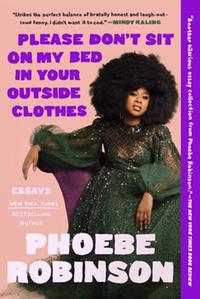
|
|
| Phoebe Robinson | |
Tiny Reparations Books founder Phoebe Robinson is a stand-up comedian, writer, producer, and actress who is the co-creator and co-star of the hit podcast turned HBO series 2 Dope Queens and other podcasts, including Sooo Many White Guys and Black Frasier. She's also the New York Times bestselling author of You Can't Touch My Hair: And Other Things I Still Have to Explain, Everything's Trash, But It's Okay, and Please Don't Sit on My Bed in Your Outside Clothes, Tiny Reparations Books' first title. She has starred in the films Ibiza and What Men Want, and was a moderator for Michelle Obama's Becoming book tour. In 2019, she launched Tiny Reparations, a production company under ABC Signature, whose first series Doing the Most with Phoebe Robinson, premiered April 2021 on Comedy Central. Her debut hour comedy special, Sorry, Harriet Tubman, premiered in October 2021 on HBO Max.
Shelf Awareness asked Robinson about the founding of Tiny Reparations Books, its many accomplishments during its first five years, and plans for the future:
What was your initial mission when you founded the Tiny Reparations Books imprint? How has it evolved?
Tiny Reparations Books started as an imprint where you A) will not be pigeonholed based on your identity and furthermore, B) it's an opportunity to show the totality of the human experience as opposed to the trauma porn that queer people and POCs and women and people with disabilities are encouraged to write. We have fun! We have sex! We are brave. Bold. Funny. Difficult. And challenging in the best way possible. So that's the mission and it will continue to be that. So writers, bring us your messiness, your brilliance, your talent!
What are you and your team most proud of accomplishing in the imprint's first five years?
The robust list! I always wanted this to be a curated imprint, so that each author felt taken care of because they put their hearts and souls into writing their books. And there's nothing worse than giving it your all only to have the marketing or promotion or editing fail you. No author should have to go through that. I believe that's part of the reason why we have such strong author retention, why our books are resonating with readers by not only landing on bestsellers lists, but National Book Awards longlists. We are attracting incredibly talented and prolific authors who are writing everything from K-Drama inspired romance to biographies on luminaries such as Marsha P. Johnson to funny slice of life stories. Every book has its own lane and stands out, which is a testament to the writers and the keen eye that our editors Emi Ikkanda and Lashanda Anakwah have for recognizing strong voices.
Can you share how you came up with the idea for Tiny Reparations Books and the name's significance?
When I met my literary agent Robert Guinsler ten years ago, he knew I wasn't a one and done author. He could probably smell the ambition (and SJP perfume) on me. Haha. Anyway, he asked me what else I wanted to do in publishing outside of the idea I had just pitched him for my first essay collection, You Can't Touch My Hair (& Other Things I Still Have to Explain). I told him I was inspired by Toni Morrison--who isn't?--and I love how as an editor at Random House she edited and supported others' works in addition to writing. I shared that passion of not only wanting to create my art, but to help others. I told Robert that instead of editing, I'd rather have an imprint, and I think Robert appreciated my vision. So the imprint was something that stayed in the back of our minds as I developed as an author.
Whether it's stand-up, television, podcast, or books, a tenet of my work is providing a platform for others. I had received so many dismissive pass letters while selling You Can't Touch My Hair in 2015. Many places told Robert that Black female authors aren't relatable, that my book wouldn't sell, etc. And then it became a New York Times bestseller, the first of three bestsellers. So I knew I was onto something with what eventually became Tiny Reparations Books. While we're still waiting on the gubment, ahem, to pay us our reparations, I've decided that publishing works by people from marginalized communities is my way of paying it forward.
 Has the current political climate changed or influenced the imprint's mission in any way?
Has the current political climate changed or influenced the imprint's mission in any way?
I think it's made us more vigilant than ever in publishing high quality work. Not only do we want to feel as though we are contributing to the rich tapestry of literature, but we know the value in persisting. In feeling joy. Books are a vehicle for people to see the humanity in others, to feel that the world is not all doom and gloom. To be inspired. It's truly an honor and a privilege to be a part of keeping hope alive.
What's something you'd like booksellers and librarians to know about Tiny Reparations Books?
Well, I think they already know this, but we're young, hungry, passionate, and we're only beginning. We're here to stay, baby! Getting to five years is no easy feat, and they have been integral to our success. So, thank you for believing in us like you do.
Can you share insight about the types of writers you are looking for, and how you know a book is for TRB's list?
Strong voices. Unique point of view. Confidence. A willingness to collaborate. I usually know in the first page or two if a book is for Tiny Reparations Books. I know that sounds wild, but it's true. It's a feeling. It's trusting your gut. And ultimately, writers should write what they want to write. Have it be the most them, undeniable, and it will find a home either with TRB or someplace else.
Lastly, what vision do you have for the imprint in the next five years--and beyond?
To keep publishing powerhouse authors. To have some more bestsellers. To have a book win a National Book Award. And to build a legacy of excellence and artistry that will outlive me. I have the coolest damn job being a publisher. I pinch myself every day.

